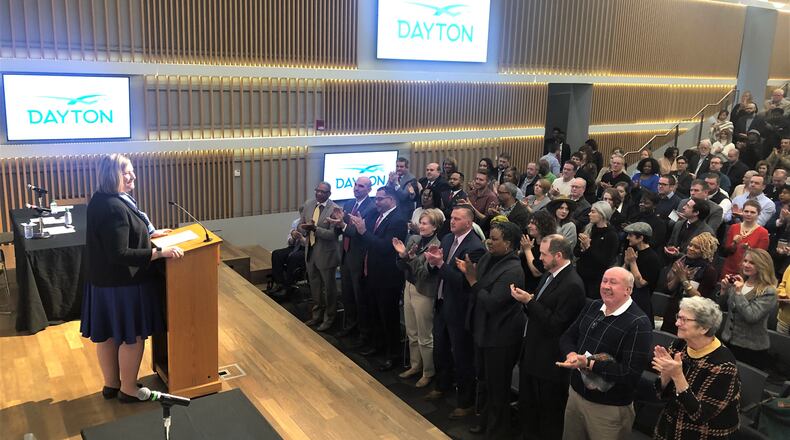Whaley said gun violence is far too common in Dayton and guns too easily get into the wrong hands.
“Daytonians have made loud and clear that this has to change,” she said.
MORE: Dayton State of City in 2019: Dayton mayor vows to reduce evictions, focuses on poverty
Whaley said she has worked with Ohio Gov. Mike DeWine and a bipartisan group of mayors and legislators on a package of“gun-safety” reforms in the state in the STRONG Ohio bill.
While the bill is not perfect, it is important step, Whaley said, adding that if legislators refuse to pass the reforms, she hopes voters will pass expanded background checks through an initiative that supporters are collecting signatures for to put on the ballot.
Whaley said last year the city’s Human Relations Council launched a pilot program that uses a public health-approach to reduce gun violence. She said the results so far have been encouraging and she hopes the model can be expanded into other neighborhoods.
The HRC received a small planning grant from the Ohio Department of Public Safety in 2018 to develop a gun-violence reduction strategy, said Erica Fields, executive director of the council.
HRC’s approach focuses on addressing factors that affect the risks of gun violence, and the money helped hire a consultant to implement a pilot project in the Residence Park neighborhood, she said.
The strategy engaged community leaders with street-level knowledge of crime and vulnerable populations and involved safety audits to identify problem places and factors, Fields said.
Residence Park has seen increased attendance at neighborhood association meetings, multiple neighborhood clean-ups and investments by the University of Dayton and the Greater Dayton RTA to address lighting issues at bus stops and demo structures on residential streets, she said.
The neighborhood saw aggravated robberies decline 54%, robbery fall 50%, aggravated assaults drop 41% and breaking and entering offenses fell by 37%, she said.
Fields said they hope to expand the program this year.
During her 27-minute speech, Whaley also revealed that a new campaign and resource will be rolled out in coming weeks called Dayton Stronger, which she says will celebrate and build on the community’s resiliency.
She said a new website will aggregate existing resources in one location.
Rebuilding the community both physically and emotionally after the mass shooting and devastating Memorial Day tornadoes will take a long time, but this year the community must focus on healing together, she said.
MORE: Many Dayton-area workers may be missing out on major tax credit
Too many neigborhoods in the city are in bad shape because of decades of population loss, private disinvestment, predatory lending and government-sanctioned discrimination, Whaley said.
When Dayton’s budget rapidly shrank years ago, the city focused on providing basic city services and rebuilding downtown because it is the jobs center, she said.
The majority of Dayton’s budget is funded by income taxes that are generated from downtown payrolls, and 75 cents out of every dollar goes into neighborhood services, Whaley said.
But the city’s budget stabilized as jobs moved back into the city, and Dayton is benefiting from market momentum that “has a life of its own,” she said.
She said the city now can more heavily focus on revitalizing neighborhoods.
“We are now in a position to give our neighborhoods a level of care and attention they need and they deserve,” she said.
Recently, she said, local leaders met to start developing a strategy to reduce vacant, abandoned, obsolete and poorly maintained properties.
They will be joined by neighborhood leaders, advocates and housing and community development officials to gather and analyze data to better understand neighborhood market dynamics.
The mayor convened a working group of community partners to try to collaborate on eliminating blight and maintaining problem properties and returning them to productive uses, said Montgomery County Treasurer Russ Joseph.
There’s no easy fixes or solutions, but the goal is to identify multiple strategies to stabilize neighborhoods, connect residents to resources and assist property owners before problems spiral out of control, he said.
“Once we’ve gathered the quantitative and qualitative data, we can then begin to figure out strategies to move us forward, to guide decisions on future city investments as well as help attract much needed private investments in our neighborhoods,” he said.
She also said an eviction task force she convened last year will soon unveil initial recommendations to keep people in their homes.
Whaley’s address also struck a grateful tone as she reflected on the crises of 2019 and how community members pulled together to try to help those in need rebuild their homes and lives.
Last year was the most challenging year of Whaley’s time as mayor, but she said the community’s kind acts were inspiring and beautiful.
“Dayton has done what Dayton does best,” she said. “We took care of each other.”
After the devastating Great Flood of 1913, the rallying cry from the community was “remember the promises you made in the attic,” and community members took part in a massive campaign to rebuild the city, Whaley said.
Dayton made it through 2019 stronger together, and together the community should work to keep the promises made last year after tragedy and heartbreak, she said.
“We can make our city more equitable and inclusive for all of our residents, regardless of their race or neighborhood,” she said. “Dayton, we can do anything if we do it together.”
About the Author

